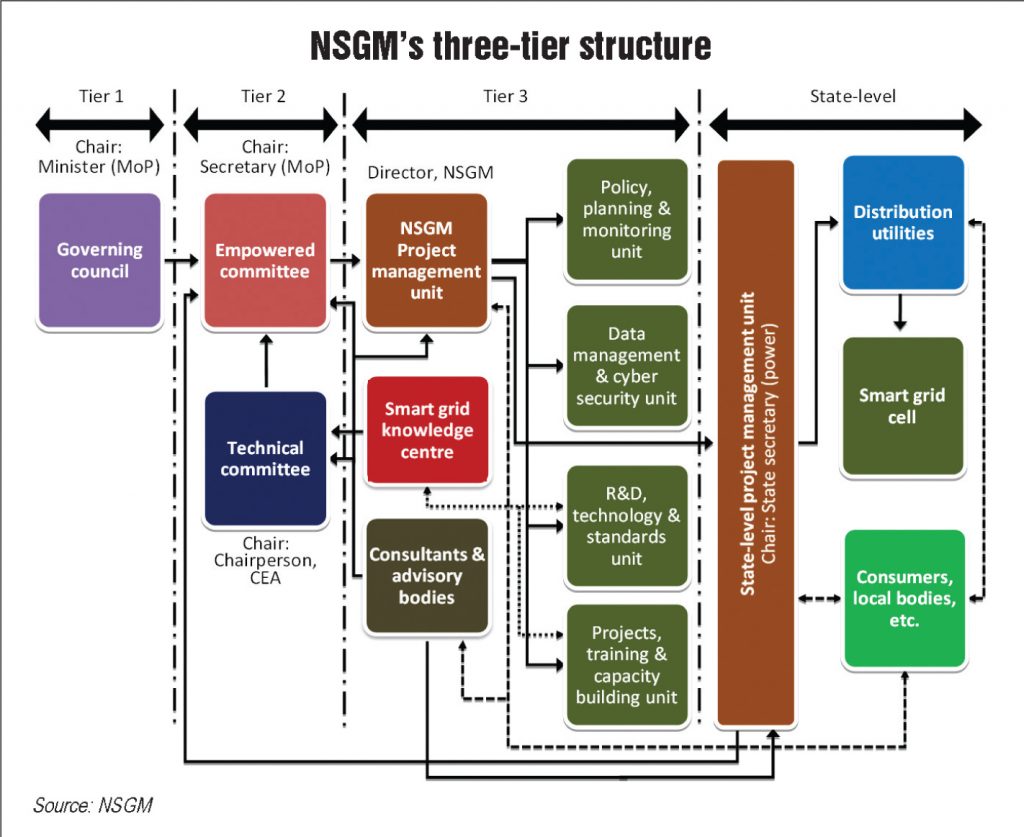
The National Smart Grid Mission (NSGM) was launched in March 2015 with the aim of creating an institutional mechanism for planning, monitoring and implementing policies and programmes related to smart grid activities. In order to achieve the goals under the mission, a series of smart grid projects is being developed across the country. Four smart grid projects, two in Maharashtra, and one each in Chandigarh and Uttar Pradesh, have so far been approved and are at various stages of implementation. These projects will be equipped with functionalities such as advance metering infrastructure (AMI), outage management system (OMS), demand response (DR), and supervisory control and data acquisition (SCADA).
A look at the status of these projects…
Smart grid projects under the NSGM
Chandigarh Electricity Department (CED), Chandigarh
The project is being implemented at Subdivision 5 of Chandigarh with 29,433 consumers. The total approved cost is Rs 285.8 million, of which the central government will contribute 30 per cent (Rs 86 million). The project has adopted AMI, distribution transformer (DT) monitoring, substation automation, rooftop solar photovoltaic (PV), and information technology infrastructure functionalities. It will be managed by Rural Electrification Corporation Power Distribution Company Limited (RECPDCL). In April 2016, the CED was issued the sanction letter. As part of the project, the CED has proposed to take up the implementation of a smart grid for the entire city. The smart grid cell and SLPMU have already been formed, and the tender document is currently under preparation.
Maharashtra State Electricity Distribution Corporation Limited (MSEDCL), Amravati, Maharashtra
The project is being implemented at Amravati with 148,000 consumers. The total approved cost is Rs 900.5 million, of which the central government will contribute 30 per cent (Rs 270.2 million). The project has adopted AMI, OMS and DR functionalities. MSEDCL was issued a sanction letter in April 2016. The tender document was floated on December 22, 2016 and the bid submission was scheduled for February 6, 2017. Meanwhile, the formation of SLPMU is awaited.
MSEDCL, Congress Nagar, Nagpur, Maharashtra
The project is being implemented at the Congress Nagar Division of Nagpur with 125,000 consumers. The total approved cost is approximately Rs 1.39 billion, of which the central government will contribute 30 per cent (Rs 417.4 million). The project has adopted AMI, SCADA, OMS and DR functionalities. MSEDCL was issued a sanction letter in July 2016, with the provision of post facto ratification by the empowered committee. The tender document was floated on December 22, 2016 and the bid submission was scheduled for February 07, 2017. Meanwhile, the formation of SLPMU is awaited.
Kanpur Electricity Supply Company Limited (KESCO), Kanpur, Uttar Pradesh
The project is being implemented in Kanpur with 539,000 consumers. The total approved cost is approximately Rs 3.2 billion, 30 per cent (Rs 958.7 million) of which will be contributed by the central government. The project has adopted AMI, peak load management, DT monitoring and distributed generation functionalities. The project was approved by the empowered committee of the NSGM in October 2016 and the sanction letter was issued to KESCO the following month. The acceptance of the sanction letter is awaited.
Conclusion
Apart from undertaking the development of smart grid projects, another key strategic area under the mission is training and capacity building. To this end, the NSGM with assistance from the United States Agency for International Development launched a series of training programmes last year aimed at building capacity and skills of utility personnel to develop smart grid infrastructure. This will help the government achieve its target of having 10 per cent of personnel from 14 of India’s state utilities trained in smart grid functions. That said, for the successful implementation of smart grid projects, there are a number of challenges that need to be addressed. For instance, currently there is a lack of testing facilities for smart meters in India. There are also issues of interoperability and of integrating the new functionalities with the existing system. Further, building a business case for smart grid, the skill development of utility staff, consumer engagement, etc., are some other areas that require attention to ensure the swift implementation of projects.




